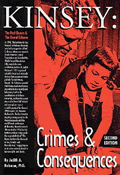Other
Kincaid
Articles:
By Cliff Kincaid
April
29, 2006
NewsWithViews.com
Dana Priest of the Washington Post won her Pulitzer Prize, but then the roof fell in on her. With the allegation that a key source for her �secret prisons� story was a partisan anti-Bush political operative in the agency, Mary O. McCarthy, the Sweetness & Light website has led the way in highlighting information about Priest�s husband, left-wing activist William Goodfellow. He is the executive director of the Center for International Policy (CIP), which is dedicated to advancing a �liberal internationalist agenda.� The CIP boasts that Goodfellow �took up the fight� against President Bush�s nomination of John Bolton as ambassador to the United Nations. The group�s� summer 2005 newsletter urges freedom of travel to communist Cuba, a �pragmatic approach� to communist North Korea, and the defeat of a plan to assist the government of Colombia in its war with Marxist terrorists.
Goodfellow, of course, is not the issue. Whether she agrees with her husband or not, the main point is that there�s no reason to believe the essence of Priest�s �secret prisons� story was true. And that�s why her prize ought to be returned.
The Post is desperate to avoid discussing this. Howard Kurtz, media reporter for the Post, declared during an on-line discussion of the controversy on April 24 that ��the thing that some critics [of Priest] are missing is that the story was true.� He�s taking the party line. This has to remain the party line because if the story is not true, there�s absolutely no justification for Priest retaining the Pulitzer. The Post fears that it may have to give back the award, in the same way it returned the Pulitzer awarded to reporter Janet Cooke for a story about a child heroin addict who turned out not to exist. Kurtz, being someone who is supposed to cover his own paper objectively, ignores the evidence and should know better. His cover-up suggests a major crisis is enveloping the paper, on the eve of the Post�s May 11 annual shareholders meeting.
The evidence is that Dick Marty, on behalf of the Council of Europe, after a major investigation, declared that �At this stage of the investigations, there is no formal, irrefutable evidence of the existence of secret CIA detention centers� in Europe. Gijs de Vries, the counterterrorism chief of the European Union, has said that he had not been able to prove that secret CIA prisons existed in Europe. �We�ve heard all kinds of allegations,� he said. �It does not appear to be proven beyond reasonable doubt.� I could find no reference to the Vries findings in the Post.
So the best defense of the Priest story is that, despite the evidence to the contrary, it may someday turn out to be true. Is this enough to justify a Pulitzer? If so, the standards of journalism have declined dramatically.
In light of the McCarthy firing, however, the common sense question becomes: how could such a story, reportedly provided by a CIA source with access to classified information, be false? The answer is that the story was embellished, either by Priest or her �sources.� McCarthy, even if she was a source, had no control over the final product. The bold but misleading headline over the Priest article was �CIA Holds Terror Suspects in Secret Prisons,� but the names of particular countries allegedly assisting the U.S. were withheld because of official concern over the damage that could be done to U.S. foreign policy. However, some countries were subsequently named by certain U.S. liberal �human rights� groups�the kinds of groups on the same side of the political spectrum as William Goodfellow�s Center for International Policy.
Using various sensational rhetorical formulations, Priest�s tabloid treatment of the controversy included calling it a �covert prison system,� a �hidden global internment network,� and a �secret detention system.� Later in the article, she did use the phrase, �secret prisons,� to refer to where terrorists may have been held. She also referred to the CIA using �a Soviet-era compound in Eastern Europe,� a clear attempt to imply that the U.S. had established a system of gulags.
The sensationalist nature of the piece may help explain why McCarthy is denying through intermediaries that she was the source of the story. Perhaps she does not want to be associated with a flawed product. Being the alleged source of the story would not only expose her to criminal prosecution over illegally disclosing classified information, it would make it look as if she was dispensing disinformation, since the �secret prisons� have not been proven to exist. McCarthy made the denial through her friend, former Clinton aide Rand Beers, in a just-released Newsweek story by Mark Hosenball and Michael Isikoff (Newsweek is a Washington Post property), and then in a R. Jeffrey Smith and Dafna Linzer story in the Post itself on April 25. This time, the denial was made through Ty Cobb, McCarthy�s lawyer in the Washington office of Hogan & Hartson.
It may have been the case that CIA flights with suspected terrorists landed in some foreign countries or that terrorists were briefly detained on foreign soil. But this doesn�t constitute a network of �secret prisons,� as alleged by Dana Priest. It does explain why the CIA would want to kill the story, since countries that worked with the U.S. on such a program, whatever its exact nature, would not want to be named publicly. Naming these countries would expose them to terrorist retaliation and violence. While Priest and the Post went along with the government�s request to leave out the names of certain countries, she failed to get the basic facts correct. It is the nature of disinformation that a false story can be more damaging than a true one.
Here�s how the �sources� in the Priest article were described:
-
U.S. and foreign officials
-
current and former intelligence officials and diplomats from three continents
-
one former senior intelligence officer
-
senior U.S. officials
-
several former and current intelligence officials and other U.S. government officials.
-
sources
-
current and former intelligence officers and two other U.S. government officials.
-
some former and current intelligence officials
-
one intelligence official
-
the intelligence official
After McCarthy was fired and reported to have been one of Priest�s sources, the Post reporter �declined to comment,� her paper said. It is noteworthy that Priest did not rule out McCarthy as a source of the �secret prisons� story.
But in deciding whether the Priest story deserved an award, the Pulitzer Prize Board should have examined it thoroughly. Another controversial part of the article was the claim that ��the revelations of widespread prisoner abuse in Afghanistan and Iraq by the U.S. military�which operates under published rules and transparent oversight of Congress�have increased concern among lawmakers, foreign governments and human rights groups about the opaque CIA system.�
However, there is no evidence of �widespread prisoner abuse in Afghanistan and Iraq by the U.S. military.� That is another gross exaggeration.
Senator Joseph Lieberman points out that abuse cases constitute �about one-tenth of 1 percent of the detainees�� and that, in the overwhelming majority of cases, detainees �have been treated within the standards that we in America would want detainees to be treated.�
|
Subscribe to the NewsWithViews Daily News Alerts! |
Priest
did not deserve any prize and her story was so flawed that it should
never have been published, let alone nominated for a Pulitzer. That
is why Washington Post chairman Donald E. Graham should give back
the award and why Priest should resign from the paper.
� 2006 Cliff Kincaid - All Rights
Reserved
Cliff Kincaid, a veteran journalist and media critic, Cliff concentrated in journalism and communications at the University of Toledo, where he graduated with a Bachelor of Arts degree.
Cliff has written or co-authored nine books on media and cultural affairs and foreign policy issues.
Cliff has appeared on Hannity & Colmes, The O�Reilly
Factor, Crossfire and has been published in the Washington Post, Washington
Times, Chronicles, Human Events and Insight.
Web Site: www.AIM.org
E-Mail: kincaid@comcast.net
It may have been the case that CIA flights with suspected terrorists landed in some foreign countries or that terrorists were briefly detained on foreign soil. But this doesn�t constitute a network of �secret prisons,� as alleged by Dana Priest.













